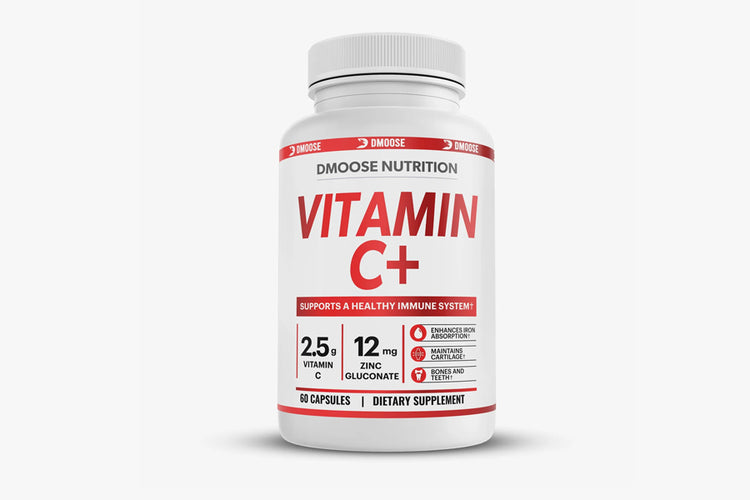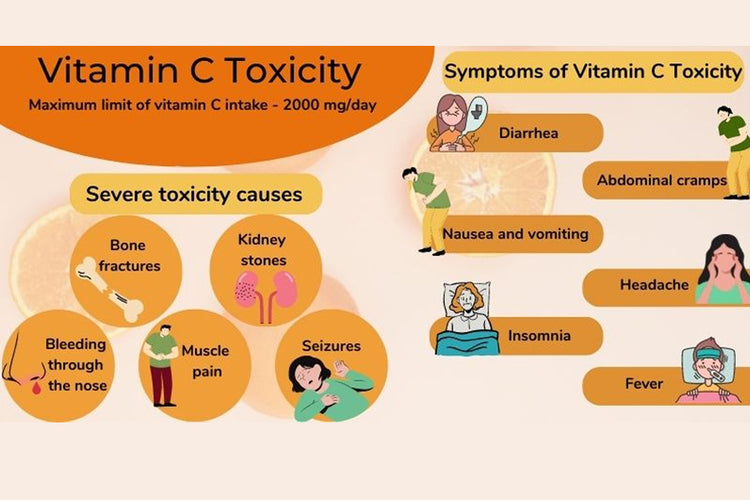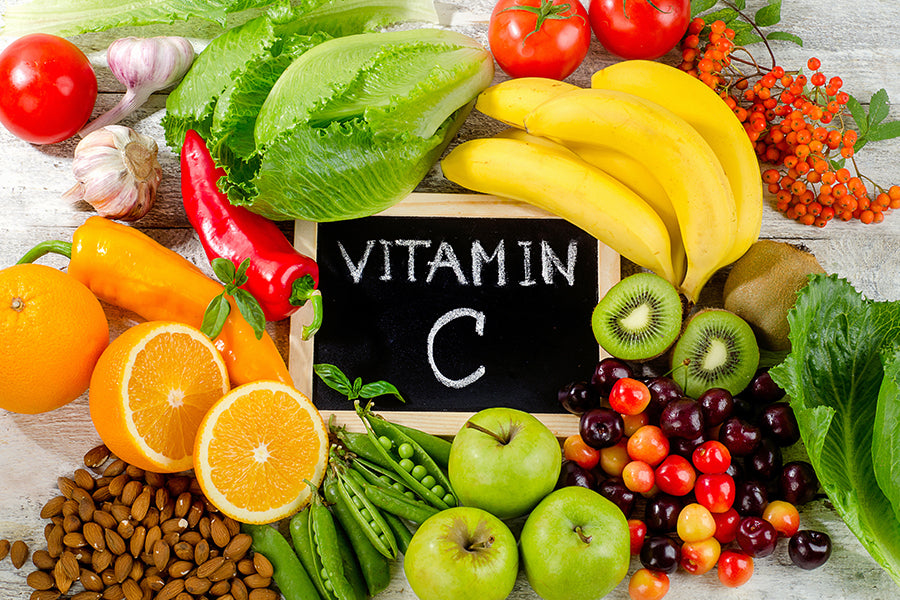You might have heard that vitamin C is the key to staying healthy, but have you ever wondered how long it stays in your system? Well, the answer might surprise you. Unlike other vitamins, your body doesn't store vitamin C for long.
It's estimated that it stays in your system for only a few hours after you ingest it. But don't worry, that doesn't mean you must constantly chug orange juice. As long as you consistently get enough vitamin C in your daily diet, you'll still reap its many benefits - boosting your immune system and keeping your skin radiant.
Vitamin C is an essential nutrient in keeping our body healthy. It is a water-soluble vitamin that needs to be replenished regularly as our body does not store it. While we know the importance of taking vitamin C in our daily diet, it is essential to understand how long it stays in our system after ingestion.
"Vitamin C is an irreplaceable vitamin for healthy skin."- Dr.Des Fernandes (Environ Founder & Scientific Director)
This article explores the factors affecting Vitamin C absorption, its benefits and side effects, and how long it takes to digest
Factors Affecting the Absorption of Vitamin C

Vitamin C+ is an essential nutrient that plays a crucial role in the functioning of our cells, tissues, and organs. However, our body's ability to absorb and utilize Vitamin C can be affected by several factors. Let's explore the main factors that influence how much Vitamin C your body gets.
Diet
What you eat plays a significant role in how well your body absorbs Vitamin C. Eating a balanced diet with plenty of fresh fruits and vegetables is one of the best ways to ensure your body gets enough Vitamin C. Consuming foods with high levels of Vitamin C, such as citrus fruits and leafy green vegetables, can help ensure adequate absorption of this vital nutrient.
Genetics
Genetics can play a significant role in determining how much Vitamin C our bodies can absorb. Individuals with specific genetic mutations may have difficulty absorbing higher amounts of Vitamin C. These individuals may need to supplement their diet with additional Vitamin C or ensure that they consume foods particularly rich in this essential nutrient.
Additionally, some genetic variations may affect the body's ability to convert dietary sources of Vitamin C into an active form and utilize it effectively. By understanding potential genetic predispositions to lower levels of Vitamin C absorption, we can better shape our diets accordingly and ensure we're getting all the vital nutrients we need correctly.
The Amount
The amount of Vitamin C you take affects how much your body absorbs. The more Vitamin C you consume, the higher the absorption rate. However, consuming too much Vitamin C at once can lead to stomach upset and diarrhea. That's why it's important to spread your consumption throughout the day and generally not exceed 1000 mg daily.
Factors such as food type, pH levels in the stomach, and other drugs or supplements taken simultaneously can also affect how much Vitamin C is absorbed. Take Vitamin C with meals for better absorption rates. Remember to always consult with your Doctor regarding what dose of Vitamin C is right for you!
Bodyweight
Body weight plays a vital role in the absorption of vitamin C. Individuals with higher body weights tend to absorb and metabolize more Vitamin C than those with smaller body sizes. This is because larger bodies have more significant metabolic needs, requiring more nutrient intake from food sources and supplements to meet their daily requirements.
Additionally, individuals with a higher body weight may have better digestive systems that can help break down and absorb nutrients better, leading to improved Vitamin C uptake. Therefore, people with high body weights need to supplement their diet with adequate amounts of Vitamin C-rich foods or take additional supplementation if needed.
Personal Health Conditions
Certain medical conditions like diabetes, liver disease, and kidney disease can affect how quickly your body absorbs vitamins such as Vitamin C. Other medical conditions, such as Crohn's diseaseand celiac disease, may affect the body's ability to absorb nutrients from food properly. People with these conditions may need to take additional supplements or consume more Vitamin C-rich foods than most other individuals.;
Other Medications/Supplements
Additionally, medications like antibiotics and oral contraceptives can interfere with Vitamin C absorption by interacting with stomach acidity levels. It is important for individuals taking regular medications to discuss supplementing their diet with extra Vitamin C or consuming more foods high in this vitamin with their healthcare provider.
Age
Age is one of the key factors affecting Vitamin C absorption in our body. The elderly, especially those above 65, absorb less Vitamin C than younger people due to changes in their digestive system and weakened kidney function.
People who have had surgery or are taking certain medications may need to adjust their intake level since these can interfere with average absorption rates. Eating foods rich in Vitamin C as part of a balanced diet is essential for everyone, but especially for the elderly, so they can reap the benefits this nutrient has to offer!
Overall, it is essential to understand how long vitamin C stays in your system and what factors affect its absorption rate so that you can get the most out of this essential nutrient. With a proper diet and supplementation plan, you can ensure your body receives all the nutrients it needs for optimal health!
How Long Does Vitamin C Remain in Your System?
So, you're wondering how long that Vitamin C stays hangin' out in your body, huh? It's tricky. Vitamin C is water-soluble, meaning it doesn't stick around in your system like a greasy burger after a late-night snack.
Nope, your body excretes it through your pee like a champ. But don't worry; it's not all bad news. The half-life of Vitamin C in your bloodstream is about 30 minutes, meaning that your levels drop by about half every half-hour.
The amount of time Vitamin C remains in your system depends on the factors listed above, but in general, it usually takes between 12 and 24 hours for it to be processed and excreted. This means that if you take a single dose of Vitamin C, its concentration in your body should begin to decline within 12-4 hours.
However, this timeline could vary depending on individual metabolism or other conditions. If you're unsure how long Vitamin C stays in your system, talk to your doctor or healthcare provider for more information.
How Long Does Vitamin C Take to Digest?

Have you ever wondered how long it takes for your body to digest Vitamin C? Well, the answer may surprise you. Unlike other nutrients, the body quickly takes vitamin C and is absorbed into the bloodstream.
It only takes about 30 minutes for your body to digest and start using Vitamin C! Of course, this can vary depending on factors like how the Vitamin C is consumed (e.g., food or supplement form), but in general, your body will start benefiting from this powerful antioxidant pretty quickly. You can also add certain antioxidant supplements to your diet for better results, along with the consumption of Vitamin C!
Whether chowing down on citrus fruits or popping some tablets, rest assured that your body is making the most of the Vitamin C you consume.
How Long Does It Take for Vitamin C to Absorb in Skin?
Vitamin C is known for its benefits in skincare. Have you ever wondered how long it takes for vitamin C to absorb into your skin? The good news is that it begins to work almost immediately. Applying a vitamin C serum or cream to your skin starts to penetrate the surface and enter the deeper layers.
This powerful antioxidant can help reduce the appearance of fine lines and wrinkles, improve overall skin texture, and even out skin tone. Remember that the exact absorption rate may vary depending on the product and your skin type, but you can typically expect noticeable results within a few weeks of consistent use.
So give your skin a little love with this skin-nourishing vitamin, and enjoy the benefits of healthier, brighter-looking skin.
Why Take Vitamin C

Vitamin C is an essential nutrient vital to your overall health and well-being. It can help boost your immunity, protect against cardiovascular disease, support healthy skin, promote collagen production, and much more. Here are some of the top benefits of Vitamin C that you should know about:
Boosts Immune System
Vitamin C is essential for a healthy immune system. It helps stimulate the production of white blood cells necessary to fight infections and illnesses. You can also add Elderberry C Immunity to your diet to enhance the effects.
It helps support the production of white blood cells, which are important for fighting off germs and bacteria that can cause illness. Vitamin C also helps produce antibodies that help fight infection and disease-causing microbes, making it an essential part of maintaining a strong immune system.
Additionally, Vitamin C works as an antioxidant, protecting your cells from damage caused by free radicals. By getting enough Vitamin C daily through diet or supplementation, you can keep your immune system functioning at its best!
Reduces Inflammation
Vitamin C has powerful anti-inflammatory properties that can help reduce inflammation in the body and promote healing at a cellular level. Vitamin C is an important antioxidant nutrient that helps to reduce inflammation. Studies have shown that Vitamin C can help reduce inflammation markers in the body, such as cytokines and C-reactive protein (CRP).
Enhances Iron Absorption
Iron is an essential mineral for the body, but it can be difficult to absorb from iron-rich foods. Did you know that vitamin C can help your body absorb iron? Iron is an essential mineral for your body's healthy functioning, helping transport oxygen throughout and supporting a strong immune system.
That's why making sure you have enough is so important! Vitamin C can actually enhance the absorption of iron - allowing it to be more efficiently utilized by our bodies. This means if you eat foods high in iron, like leafy greens or legumes, adding vitamin C-rich fruits or vegetables could further boost their benefit. Plus, getting adequate nutrients may reduce fatigue and promote overall health.
Supports Cardiovascular Health
Vitamin C is an essential vitamin for overall health and wellness. But did you know that it can also support cardiovascular health? Vitamin C is a powerful antioxidant that helps reduce oxidative stress in the body, which benefits heart health. Studies have shown that higher levels of Vitamin C are associated with lower risk of cardiovascular disease, stroke, and high blood pressure.
Vitamin C also plays an essential role in maintaining healthy cholesterol levels by helping your body produce more good HDL cholesterol while reducing bad LDL cholesterol. So if you want to improve your heart health, get enough Vitamin C in your diet!
Enhances Energy Levels
Taking vitamin C helps to boost your natural energy levels, making it easier to stay active and productive throughout the day. It helps maintain healthy bodily functions, which can energize you. Vitamin C is also a powerful antioxidant that helps combat fatigue and stress, which drain your body's energy reserves.
Essential for Wound Healing
Vitamin C plays a significant role in wound healing as it helps to repair damaged tissue and accelerate healing time. It plays a vital role in producing collagen, which, along with other proteins, forms connective tissue that repairs and strengthens damaged skin cells. Vitamin C has also been shown to increase the formation of new blood vessels around wounds, which can help improve circulation and reduce inflammation.
Additionally, Vitamin C has antioxidant properties that protect against oxidative stress caused by free radicals, helping to minimize scarring and speed up healing time. Taking a vitamin C supplement or eating foods rich in this nutrient, such as citrus fruits and leafy greens, may be beneficial for boosting your body's ability to heal wounds.
Overall, vitamin C is an essential nutrient for optimal health and well-being. Taking it regularly can help support a healthy immune system, reduce inflammation, enhance energy levels, and more!
We recommend talking to your healthcare provider about the best way to get enough of this essential nutrient in your diet. With the right dietary plan or supplementation program, you will be well on your way to taking advantage of all that vitamin C has to offer!
Related Article: Collagen for Weight Loss: How Supplements May Help?
Some Side Effects to Consider

Although vitamin C is generally safe for most people, there are potential side effects associated with taking too much. However, like any supplement, it can also have side effects if taken in large doses.
Common side effects of taking too much Vitamin C include digestive issues such as nausea, vomiting, abdominal bloating, and diarrhea. Headaches, skin flushing (redness or warmth), fatigue, increased urination, and general discomfort may also occur with high doses of vitamin C.
Upset Stomach and Diarrhea
Consuming too much vitamin C can cause digestive issues such as an upset stomach or diarrhea. Upset stomach and diarrhea are two common side effects of taking high Vitamin C supplements.
If you experience these symptoms after consuming more than your recommended amount, take a brief break from the supplement and consult your doctor if needed. It's also important to note that drinking plenty of water when consuming Vitamin C can help reduce many unpleasant side effects. So make sure to stay hydrated!
Headache and Fatigue
One of Vitamin C's most common side effects is headaches and fatigue. Headaches are usually temporary and may be caused by increased blood flow to the brain or dehydration. Fatigue can be caused by Vitamin C's role as an antioxidant, which helps defend cells from damage and takes energy away from other processes.
If you experience these symptoms while taking Vitamin C, try reducing your dosage or speaking with your doctor about alternative solutions. Taking breaks between doses can also minimize potential side effects.
Risk of Kidney Stones
High doses of vitamin C may increase the risk of developing kidney stones in some people. Taking more than 2000 mg of Vitamin C per day may cause your body to produce too much oxalate, a compound found in many foods that can lead to the formation of kidney stones.
Symptoms of kidney stones include pain in the side or lower back, pain when urinating, blood in the urine, and nausea. If you experience any of these symptoms, be sure to contact your doctor immediately for further evaluation and treatment.
Interactions With Medications
Certain medications, such as antibiotics, can interact negatively with hefty doses of vitamin C. Be sure to discuss any supplements you are taking with your healthcare provider.
Getting adequate vitamin C from food sources is safe and effective for most people. However, if you want to supplement, speak with your healthcare provider first. They can help determine the best dosage for your individual needs.
Remember, Vitamin C plays an essential role in overall health and wellness - so remember to get enough of this essential nutrient! With proper supplementation and diet, you will be well on your way to enjoying all that vitamin C offers!
FAQs
1. How long does liposomal vitamin C stay in your system?
We all want to know how long supplements stay in our system. Well, when it comes to liposomal vitamin C, the answer is quite fascinating. Unlike regular vitamin C, which is quickly metabolized and eliminated from the body, liposomal vitamin C's encapsulation process helps it stay in circulation for much longer.
Its high bioavailability makes it last up to 24 hours compared to other forms of vitamin C. So if you're looking for an efficient way to boost your immune system and support your overall health, liposomal vitamin C is the answer you need!
2. How much vitamin C can your body absorb in a day?
Vitamin C is essential to maintaining a healthy body, but have you ever wondered how much your body can absorb in a day? The amount varies depending on a few factors. The recommended daily vitamin C intake is around 90 mg for men and 75mg for women. However, the body can only absorb a certain amount, usually around 200mg.
So, even if you take a high dose of vitamin C, your body can only absorb so much before it's excreted in your urine. The good news is that it's easy to get your daily vitamin C from foods like oranges, broccoli, and red bell peppers, which can provide up to 100% of your recommended intake in just one serving.
3. How long does 1000mg of vitamin C remain in the human body?
Are you curious how long 1000mg of vitamin C stays in your system? The answer is complex. While the recommended daily intake for vitamin C is around 75-90mg daily, taking 1000mg in one dose can affect different people. Some individuals can absorb and utilize more vitamin C, keeping their system for extended periods.
Generally speaking. However, it's safe to say that vitamin C has a short half-life in the body, meaning it is quickly utilized and excreted. So, while taking a vitamin C supplement can benefit, it's important to regularly consume foods rich in vitamin C to maintain optimal levels.
4. How long does a vitamin C overdose last?
Vitamin C is an essential nutrient that helps keep our immune systems strong and healthy. Most of us get the recommended daily dose of this vitamin through our diet or supplements, but some may need more time to do it and experience an overdose. The good news is that an overdose of vitamin C is usually not harmful and typically only lasts a few hours.
So, if you accidentally take too many vitamin C tablets or eat too many oranges, don't worry too much. You'll likely experience mild stomach upset, diarrhea, or nausea, but they should subside soon. Just be sure to stick to the recommended dose next time to avoid any discomfort.
The Bottom Line
Vitamin C is crucial for maintaining optimal health, and you must ensure that you get meet your daily vitamin C requirements by consuming vitamin C-rich foods, supplements, or topical products. The time vitamin C stays in your system varies depending on how it's absorbed and the formulation you take.
While consuming vitamin C is generally safe, it is essential to follow the recommended daily intake and avoid overdosing. With this knowledge, you can protect your body while enjoying the numerous health benefits of vitamin C.
Reading List
Article Sources
- Carr, Anitra C., and Silvia Maggini. "Vitamin C and Immune Function." Nutrients, vol. 9, no. 11, Nov. 2017, p. 1211. PubMed, https://doi.org/10.3390/nu9111211.
- Hurrell, Richard, and Ines Egli. "Iron Bioavailability and Dietary Reference Values." The American Journal of Clinical Nutrition, vol. 91, no. 5, May 2010, pp. 1461S-1467S. PubMed, https://doi.org/10.3945/ajcn.2010.28674F.
- Kim, Mi Kyung, et al. "Effect of Five-Year Supplementation of Vitamin C on Serum Vitamin C Concentration and Consumption of Vegetables and Fruits in Middle-Aged Japanese: A Randomized Controlled Trial." Journal of the American College of Nutrition, vol. 22, no. 3, June 2003, pp. 208-16. PubMed, https://doi.org/10.1080/07315724.2003.10719295.li>
- Knekt, Paul, et al. "Antioxidant Vitamins and Coronary Heart Disease Risk: A Pooled Analysis of 9 Cohorts." The American Journal of Clinical Nutrition, vol. 80, no. 6, Dec. 2004, pp. 1508-20. PubMed, https://doi.org/10.1093/ajcn/80.6.1508.
- Pham-Huy, Lien Ai, et al. "Free Radicals, Antioxidants in Disease and Health." International Journal of Biomedical Science: IJBS, vol. 4, no. 2, June 2008, pp. 89-96.











